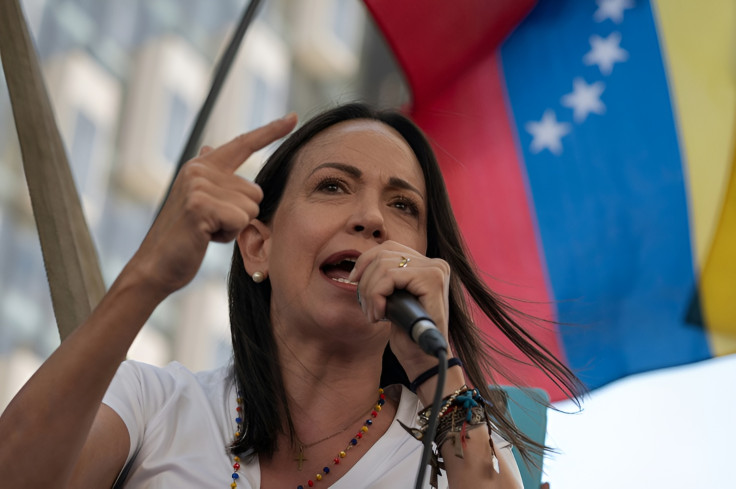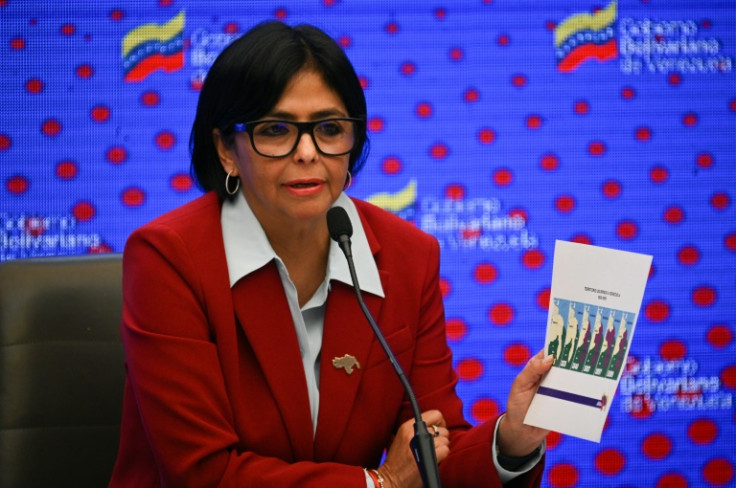
Venezuela's top opposition leader María Corina Machado warned that a controversial bill introduced by the Maduro government could lead to her imprisonment, as its goal of fighting "fascism" could be broadly interpreted to further crack down on dissent.
"Mi teams across the country are at risk of being forcefully disappeared and i could be the target of an unjustly detention as well," said Machado in a letter sent to 18 countries in America, Europe and Africa, as well as the EU's High Representative for Foreign Affairs, Josep Borrell.
Machado, who won a wide-ranging opposition primary last year to become its sole presidential candidate, said that it's important to "use all diplomatic means possible" so all elections-related agreements are "honored completely."
Hoy he enviado esta carta a los gobiernos de Alemania, Argentina, Barbados, Bolivia, Brasil, Canadá, Chile, España, Estados Unidos, Francia, Honduras, Italia, México, Noruega, Portugal. Reino Unido, San Vicente y las Granadinas, Sudáfrica, así como al Alto Representante de la UE… pic.twitter.com/CDK46siyOw
— María Corina Machado (@MariaCorinaYA) April 3, 2024
However, in another passage of the letter Machado said that the agreements had been "entirely violated" by the Maduro government and blamed it for creating "roadblocks" for the opposition to take part in the elections, set for July. She was banned from competing by the Supreme Court, a decision that led her to anoint another candidate, Corina Yoris, who was prevented from running as well.
Maduro has called Machado's party a "terrorist movement," potentially making its members targets of the "fascism" bill. The initiative was set forth this week by the government-controlled Legislative Assembly.
The bill was introduced by the country's executive vice president, Delcy Rodríguez, and establishes "means to preserve the public calm and the democratic exercise of the popular will."
When doing so, Rodríguez made a not-so-veiled reference to the country's opposition. She named widespread protests against the government in 2014 and 2017 and said that "extremists" asked for a "criminal blockade" to cause an "economic and social genocide."

But what does this bill seek? Firstly, it prohibits the "spread of messages that promote violence as a method of political action." It also creates a "commission against fascism" and an international network of groups committed to advancing these goals and imposes "criminal and administrative sanctions" to those who break the law.
The bill comes as the Maduro government faces increased criticism for preventing several opposition figures from competing in the presidential elections. In fact, some of those who expressed concern over the decisions included the presidents of Colombia and Brazil, regional figures who had one of the most cordial relationships with Maduro.
Machado has sought to capitalize on this increased criticism, thanking Colombia and Brazil for the statements and urging the international community to maintain its pressure.
Machado's Democratic Unitary Platform (PUD) was forced to register an unknown candidate after being unable to sign up Yoris -already a plan B- to face off against Maduro, who is seeking a third term in office.
After being unable to register Yoris by the deadline, the PUD managed to slip in the name of a little-known former ambassador, Edmundo Gonzalez Urrutia, as a "provisional" candidate who Machado now hopes she will be able to replace.
Another candidate, Manuel Rosales, the governor of the oil-rich province of Zulia and a member of the PUD coalition, also managed to sign up last-minute, though he has been accused of "betrayal" by Yoris for splitting the opposition vote.
© 2025 Latin Times. All rights reserved. Do not reproduce without permission.





